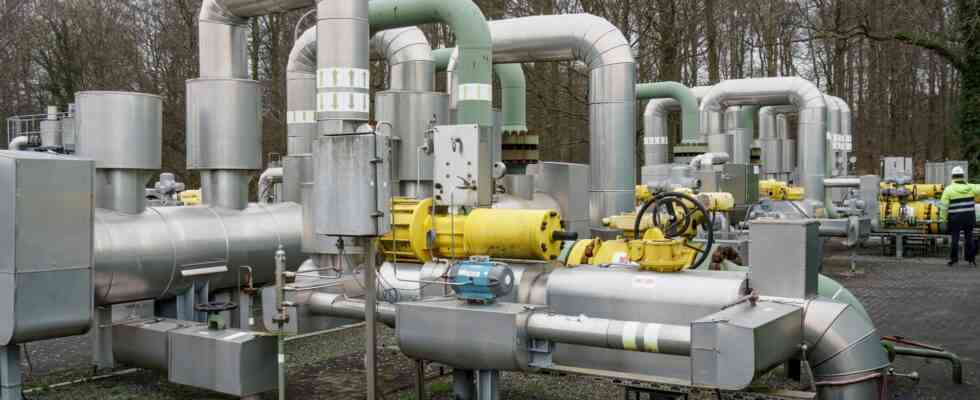As of: 03/25/2022 4:47 p.m
The filling levels of the gas storage tanks are to be re-regulated – the Bundestag has decided: Specifically, the relevant operators are to be obliged to gradually fill the storage tanks up to 90 percent by December 1st of each year.
The gas storage facilities in Germany should always be sufficiently filled in the future. The Bundestag approved a corresponding law. Specifications are intended to secure the gas supply and curb price fluctuations. The government factions, Union and Left Party voted for the law, the AfD abstained.
According to this, the gas storage facilities in Germany must be gradually filled to 90 percent by December 1st. The filling level should reach 65 percent by August 1st and 80 percent by October 1st. On February 1st of the following year, a minimum filling quantity of 40 percent applies again. In the future, users of gas storage facilities will have to fill the capacities they have booked – otherwise they will be withdrawn. The law is limited until April 2025. The Ministry of Economic Affairs is to evaluate the implementation by mid-December of this year, and the effects by April 2023.
The law is also a response to Russia’s war against Ukraine and turbulence in gas prices. The storage levels were historically low this winter, according to the Ministry of Economic Affairs. This applies in particular to the storage facilities of the Russian state-owned company Gazprom. Such a situation must not be repeated next winter.
Lowest values at fill levels
According to the Federal Ministry of Economics, Germany has by far the largest storage volume for natural gas in Central and Western Europe, at 24 billion cubic meters. This winter, however, the fill levels in the gas storage tanks reached their lowest levels.
In Germany, in particular, the German gas storage facilities, which belong to the Russian company Gazprom, were not sufficiently filled before the onset of winter. According to the Ministry of Economics, the responsible authorities have not been able to intervene so far because of the extensive liberalization of the gas market. That is now changing.
Gas storage industry sees many risks from law
With the new regulations, the gas storage industry faces major financial, legal and operational risks. The Energy Storage Initiative (INES) criticized that the changes would subject a previously liberalized gas storage market to strict regulations with far-reaching consequences. INES Managing Director Sebastian Bleschke said the Gas Storage Act introduces regulations that make gas storage unattractive for market players.
Union: Time limit has made approval easier
The time limit made it easier for the Union in the Bundestag to approve the gas storage law, said MP Andreas Jung (CDU). AfD politician Steffen Kotré accused Economics Minister Habeck of not having adequately examined extending the lifetime of nuclear power plants.
SPD MP Bengt Bergt complained that Germany’s previous dependence on Russian gas was based on “past mistakes”. In 2015, Gazprom “consumed” the largest gas storage facility in Germany; that was not seen as a problem at the time. “We were very wrong,” Bergt continued. With the law that has now been passed, Germany is now sending an important signal to Moscow.
German democracy is “strong, capable of acting, fast and flexible”. Bergt admitted that alternatives to Russian gas are needed “as soon as possible”.
Habeck: Advances in oil and coal
And that is exactly what the traffic light coalition is trying to do: According to Federal Economics Minister Robert Habeck, Germany is reducing its dependence on Russian energy imports “at a rapid pace”. By the middle of this year, “Russian oil imports to Germany are expected to be halved,” said Habeck in Berlin this morning. By the end of the year, the aim is to be “almost independent” of Russian oil.
The dependency on coal will also drop from 50 to around 25 percent in the coming weeks, Habeck said. By autumn it will be possible to become independent of Russian hard coal.
“Two winters are still to come”, Daniel Pokraka, ARD Berlin, on the dependency on Russian gas
Tagesschau 3:00 p.m., 25.3.2022
With gas, the process takes a little longer. Habeck again emphasized that a complete embargo on Russian gas is currently not possible. “The economic and social consequences would still be too serious.” Nevertheless, there is also progress with gas, but the process is “demanding”. However, it is possible to become “largely independent” from Russian gas “by mid-2024”. However, this is only possible with a strong expansion of renewable energies.

